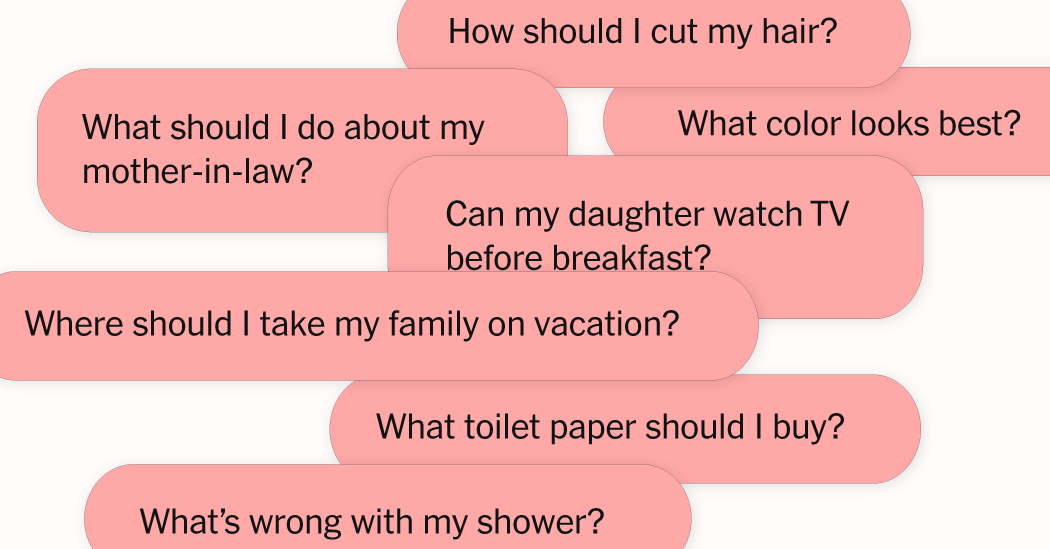As soon as President-elect Donald J. Trump won the presidential race, influencers on Rumble, the right-wing alternative to YouTube, flooded the platform with a simple catchphrase: “We are the media now.”
The idea seemed to capture a growing sense that traditional journalists have lost their position at the center of the media ecosystem. Polls show that trust in mainstream news media has plummeted, and that nearly half of all young people get their news from “influencers” rather than journalists.
In its place, they argue, are right-wing digital creators who have found hordes of fans online. Rumble, for instance, is tiny compared with YouTube, but it is a primary source of news for millions of Americans, according to Pew Research Center. On election night, its active viewership topped out at more than two million, and the company said in a statement that it averaged more than 67 million monthly active users in the final quarter of 2024.
If Rumble was the media now, I wondered what it would be like to consume an all-Rumble diet. So on Nov. 18, about two weeks after the election, I deleted my news apps, unsubscribed from all my podcasts and filtered all my newsletters to the trash. And for the next week, from early morning till late at night, I got all my news from Rumble.
An alternate reality
I started by visiting Rumble’s homepage on Monday morning where I saw my first recommended video. It was about the risk of nuclear war, with an A.I.-generated photo of President Biden laughing maniacally above a headline that read: “WWIII INCOMING?! Biden Authorizes Strike on Russia Ahead of Trump Taking Office!!”
Rumble was once an obscure video platform featuring mostly viral cat videos. Founded in 2013 by a Canadian entrepreneur, it was designed as a home for independent creators who felt crowded out on YouTube. But the platform took a hard right turn around the time of the Capitol riots on Jan. 6, 2021, when social networks and YouTube cracked down on users who violated their rules. Conservatives flocked to other platforms, including Rumble, which quickly embraced its new role as a “free speech” haven — and saw its valuation surge to half a billion dollars practically overnight.
Its content today goes far beyond cat videos. Video game livestreams populate its homepage alongside a bizarre face-slapping competition called “Power Slap.” But political commentary and news remain its most popular categories by far.
The front page
A screenshot from the first day of this experiment shows videos about WWIII and live categories focused on news, entertainment and “conspiracies.”
I chose a selection of popular “news” shows to watch, along with political content from other areas, like its active “conspiracies” section.
Because my experiment began so soon after Mr. Trump swept to victory on Nov. 5, I expected many of the videos to feel triumphant.
There were a few moments of joy: After the hosts of “Morning Joe,” the MSNBC talk show, visited Mr. Trump at Mar-a-Lago, hosts of Rumble shows gleefully mocked them, saying they went to “kiss the ring and bend the knee.” Clips of N.F.L. athletes doing Mr. Trump’s dance moves were a sign, the hosts said, that Mr. Trump had recaptured popular culture from the clutches of Hollywood liberals.
Multiple shows criticized the same clip from “Morning Joe”
▶ Stay Free with Russell Brand
But their happiness quickly gave way to a relentless outpouring of anger and frustration, as they fixated on a cast of perceived enemies to blame for America’s troubles — from Democratic politicians to TikTok personalities to Republican adversaries.
Just a few hours into the experiment, it was clear that I was falling into an alternate reality fueled almost entirely by outrage. Among the claims I heard:
Some people at think tanks in Washington were “morons” and “crazier than any schizophrenic.”
The Department of Homeland Security was running a “sex-trafficking operation,” a claim apparently based on a misreading of a government report. (The report, by the Department of Homeland Security’s Office of the Inspector General, indicated that more than 300,000 unaccompanied minors had not received a notice to appear in court or had received the notice but had failed to appear. Some conservative commentators said this meant the children were being trafficked, but experts in immigration policy said it meant no such thing.)
Progressives were trying to get Republicans killed — a claim based on death threats that Representative Marjorie Taylor Greene of Georgia said she received.
After only one day, I could feel my perspective shifting. When I described to my wife what I was hearing on Rumble, she said I was right to feel uneasy because the world I was immersing myself in sounded genuinely awful.
Hour by hour, Rumble’s hosts stoked fears about nearly everything: culture wars, transgender Americans and even a potential World War III.
‘Do you guys know where your fallout shelters are?’
On the second night, while catching up on the show “Redacted,” I heard that World War III was more or less imminent because of rising tensions with Russia but that most Americans were unaware of it.
Exactly what to make of this remained unclear to me, but I suspected tensions would need to rise much further before bombs started dropping. Clayton Morris, a former Fox News personality who co-hosts the show with his wife, seemed convinced that nuclear war was coming, describing the lack of fallout shelters in major cities throughout the United States. (I later read news articles that offered a fuller picture, suggesting that the risk of escalation was real but that nuclear threats were also a strategy in Mr. Putin’s saber rattling.)
The coverage struck me as particularly scary, but I also paused to consider whether Mr. Morris had any credentials as a Russia-Ukraine analyst. Since 2017, he has pivoted his career from hosting television shows to offering investors “financial freedom” through real estate investing. He was sued in 2019 by two dozen clients who said they were sold ramshackle homes as investment properties, then relocated his family to Portugal before the lawsuits were settled — which some said complicated the litigation proceedings. (Mr. Morris denied any wrongdoing.)
On Rumble, though, he seemed authoritative: His slickly produced show had more than 560,000 followers and it aired daily with an active comments section filled with supporters. The videos were recommended to me by Rumble’s algorithm, so I kept watching.
Other shows referenced clips directly from Russian state television or the Russian government. During “The Roseanne Barr Show,” a segment about nuclear war bled into an ad for an emergency health kit. (In an email, the show’s co-host Jake Pentland, who is Ms. Barr’s son, told me their show wants to keep Americans “safe and protected from this wildly corrupt administration whether that’s through education or highlighting specific products that can protect them.”)
The prospect of an impending World War III stuck with me long after the livestreams ended. As I shuttled my son to day care or walked down aisles at the grocery store, I found my mind drifting to thoughts of nuclear bombs, a military draft or how a global conflict might actually unfold.
While watching a segment on the dire prediction, I glanced over at my wife, who was enjoying Netflix’s romantic comedy series “Nobody Wants This,” unaware about the threat of nuclear winter.
‘Who’s in charge now? We are.’
As the days ticked by, I saw how the outrage stoked online could burst into the real world.
Early in the week, multiple hosts on Rumble were furious over a Democratic official in Pennsylvania who they suggested was trying to steal the election by counting invalid ballots. The controversy gained nationwide attention and the official, Diane Ellis Marseglia, the commissioner for Bucks County, Pa., received profanity-laden emails and death threats.
Reading news articles about it later, though, it was clear the situation was more complicated than the hosts had suggested. The courts responded with additional guidance and the county followed the law.
The official eventually apologized for using a badly worded statement that stoked the backlash — and her apology video also made the rounds on Rumble.
“We are all going to learn lessons from this new media landscape,” Ms. Marseglia said in her apology. “Most of all, I am.”
Dan Bongino, the host of “The Dan Bongino Show,” relished the moment.
“Who’s in charge now? We are,” he said triumphantly. “Who made this a story? Us.”
It seemed clear that actual news — the objective details about complex situations like election proceedings or the war in Ukraine — mattered far less than how these situations could be contorted to support Mr. Trump or deride Democrats. Nearly every show created a visceral feeling that the nation was barrelling from crisis to crisis.
Progressives were getting away with galling levels of incompetence or corruption, the hosts said over and over again. Even though Mr. Trump and the Republican Party would soon control the White House and Congress, and conservatives have a majority on the Supreme Court, there were more battles to come.
After just a week, this alternate reality started shifting how I instinctively reacted to the world outside Rumble. I would catch a stray story on the local news radio about something innocuous, like train delays or traffic jams, and wonder: “Can I really trust this?”
It’s true that listening to any single news source long enough will shift your perspective. But few sources have as many ties to Mr. Trump and his incoming administration as Rumble. Its top personalities are frequently seen with Mr. Trump at events or at Mar-a-Lago, his Florida home, with hosts suggesting they will have special access to the administration.
Vivek Ramaswamy, Mr. Trump’s pick for a new government efficiency initiative, and Howard Lutnick, the likely commerce secretary, owned millions of dollars worth of Rumble shares when it went public in 2022.
So did Craft Ventures, which was co-founded by David Sacks, an investor who sits on Rumble’s board of directors and was recently named Mr. Trump’s pick for cryptocurrency czar.
Christopher Pavlovski, Rumble’s founder and chief executive, has emerged as a Trump ally, too. In a post on X, he shared a photo from after the election of him standing next to several people, including Elon Musk, one of Mr. Trump’s most prominent backers. At the back of the frame and grinning was the soon to be 47th president of the United States.
“Free speech saved,” Mr. Pavlovski wrote.
I received a statement from Tim Murtaugh, a representative for Rumble who was also Mr. Trump’s communications director for his 2020 campaign. He said: “The New York Times and its fellow legacy media outlets have lost their monopoly on deciding what information people can have, so of course they’re rushing to attack Rumble, a key alternative in the news marketplace.”
The ‘planet might be saved’ by Trump.
The fear and outrage that infused every show was offset by a sense of hopefulness that the president-elect would fix everything — even that the “planet might have been saved” because he was re-elected.
Blame for any hiccups in Mr. Trump’s strategy was assigned to Democrats or even Republicans who were not sufficiently obedient.
Senator Tommy Tuberville, an Alabama Republican, said on one show that while Republicans controlled the Senate, the party remained “a third MAGA, a third Republican and a third RINO,” meaning “Republican in name only.”
“We’ve got control, but do we have control?” Mr. Tuberville summarized.
Perhaps the biggest cheerleader for Mr. Trump was Mr. Bongino, the eponymous host of Rumble’s most-watched show, with 3.4 million followers.
Mr. Bongino is a former Fox News host who ran three unsuccessful bids for elected office before striking gold in the right-wing commentary business. The podcast version of his show consistently ranks among the top news podcasts in the country. Rumble’s financial documents show that his company, Bongino Inc., owned 5.8 percent of the company when it went public in 2022, now worth more than $100 million.
Though I listened to an hour of Mr. Bongino’s opinions each day, it seemed like I learned mostly what various progressive or mainstream media figures had said about different culture war topics, and Mr. Bongino’s predictable reactions to them.
Bongino’s focus
Many segments on Mr. Bongino’s show included comments from liberals or mainstream news media, along with Mr. Bongino’s predictable reactions to them.
Note: Times are approximate
On his Thursday show, he talked about the nation’s intelligence apparatus — but it was in response to what a CNN host had said about its effectiveness.
He talked about cancel culture — but in response to a comment on “The View” about Matt Gaetz, Mr. Trump’s first pick for attorney general.
He talked about identity politics — but in reaction to what a Democratic congresswoman said about race.
He talked about the murder conviction of an undocumented migrant — but in reaction to what a news anchor had said about the case on ABC News.
Nearly every show I watched on Rumble framed issues this way, focusing on how news was discussed by mainstream media, and then complaining about it.
I don’t remember seeing Mr. Bongino criticize Mr. Trump — not once. He spent the first part of the week saying that Mr. Gaetz, the former Republican congressman who was briefly a contender for attorney general, would surely be confirmed. He seemed to dismiss a federal sex-trafficking investigation into Mr. Gaetz by saying it was impossible to find “good” people for top roles. (Mr. Gaetz denied any wrongdoing and the Justice Department declined to file charges.)
When Mr. Gaetz withdrew his name from consideration later that week after significant pushback, Mr. Bongino never faulted Mr. Trump for the whole ordeal. Instead, he blamed Republicans and said it was part of Mr. Trump’s strategy to intentionally overwhelm his critics with controversial picks.
‘You’re going to become part of the show.’
After watching Rumble nonstop for days, I realized this very article was likely to fuel its own cycle of outrage on the platform. But I was surprised when that happened before it was even published.
I wrote to everyone mentioned in the article to ask for their perspective about Rumble and its popular shows, but few replied. Instead, people like Russell Brand, the former actor turned political commentator, took one of my emails and made an entire segment out of it. Mr. Bongino called me “public enemy No. 1” and claimed my story would focus on Rumble’s fringiest voices in a bid to get the site banned.
“Don’t ever email us,” he warned. “Don’t. Because you’re going to become part of the show.”
Mr. Pentland, the co-host of “The Roseanne Barr Podcast,” posted the email I sent him to his X account. Rumble’s chief executive reposted it, then Elon Musk reposted that to his more than 200 million followers. My phone number was visible, and apparently seen more than 50 million times on the platform, so I was soon flooded with angry phone calls and texts calling my article (which hadn’t yet been published) a “hit job” focused on World War III.
On his show, Mr. Pentland referenced my email and said his original ad for a nuclear fallout health kit was meant to “educate our audience” about alternative medicines.
Then that segment bled into another ad for the health kit.
Stephen K. Bannon, host of “War Room,” relayed a message through his producer, saying that his show “exists as the information arm for the activist cadre at the tip of the spear of the MAGA movement.”
Candace Owens, the host of the “Candace Show,” was the only one who called me back. She said she was focusing less on political outrage lately after growing weary of chasing negativity.
“I realized I was waking up every day and I was looking for things to be angry at,” she said. “And that wasn’t healthy for me.”









